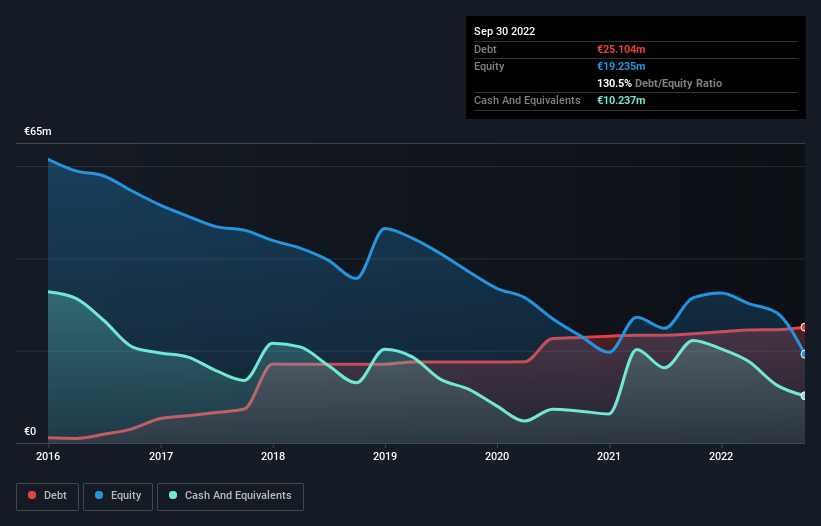
Warren Buffett famously said, 'Volatility is far from synonymous with risk.' It's only natural to consider a company's balance sheet when you examine how risky it is, since debt is often involved when a business collapses. We can see that voxeljet AG (NASDAQ:VJET) does use debt in its business. But the real question is whether this debt is making the company risky.
Why Does Debt Bring Risk?
Debt assists a business until the business has trouble paying it off, either with new capital or with free cash flow. Ultimately, if the company can't fulfill its legal obligations to repay debt, shareholders could walk away with nothing. While that is not too common, we often do see indebted companies permanently diluting shareholders because lenders force them to raise capital at a distressed price. Having said that, the most common situation is where a company manages its debt reasonably well - and to its own advantage. The first step when considering a company's debt levels is to consider its cash and debt together.
Check out the opportunities and risks within the US Machinery industry.
How Much Debt Does voxeljet Carry?
The image below, which you can click on for greater detail, shows that at September 2022 voxeljet had debt of €25.1m, up from €23.7m in one year. However, it also had €10.2m in cash, and so its net debt is €14.9m.

How Healthy Is voxeljet's Balance Sheet?
Zooming in on the latest balance sheet data, we can see that voxeljet had liabilities of €34.5m due within 12 months and liabilities of €5.34m due beyond that. On the other hand, it had cash of €10.2m and €5.72m worth of receivables due within a year. So its liabilities total €23.9m more than the combination of its cash and short-term receivables.
When you consider that this deficiency exceeds the company's €21.3m market capitalization, you might well be inclined to review the balance sheet intently. In the scenario where the company had to clean up its balance sheet quickly, it seems likely shareholders would suffer extensive dilution. When analysing debt levels, the balance sheet is the obvious place to start. But it is future earnings, more than anything, that will determine voxeljet's ability to maintain a healthy balance sheet going forward. So if you're focused on the future you can check out this free report showing analyst profit forecasts.
Over 12 months, voxeljet reported revenue of €28m, which is a gain of 23%, although it did not report any earnings before interest and tax. Shareholders probably have their fingers crossed that it can grow its way to profits.
Caveat Emptor
Despite the top line growth, voxeljet still had an earnings before interest and tax (EBIT) loss over the last year. Its EBIT loss was a whopping €8.7m. When we look at that alongside the significant liabilities, we're not particularly confident about the company. It would need to improve its operations quickly for us to be interested in it. Not least because it had negative free cash flow of €9.5m over the last twelve months. That means it's on the risky side of things. The balance sheet is clearly the area to focus on when you are analysing debt. However, not all investment risk resides within the balance sheet - far from it. Be aware that voxeljet is showing 4 warning signs in our investment analysis , and 1 of those doesn't sit too well with us...
At the end of the day, it's often better to focus on companies that are free from net debt. You can access our special list of such companies (all with a track record of profit growth). It's free.
New: AI Stock Screener & Alerts
Our new AI Stock Screener scans the market every day to uncover opportunities.
• Dividend Powerhouses (3%+ Yield)
• Undervalued Small Caps with Insider Buying
• High growth Tech and AI Companies
Or build your own from over 50 metrics.
Have feedback on this article? Concerned about the content? Get in touch with us directly. Alternatively, email editorial-team (at) simplywallst.com.
This article by Simply Wall St is general in nature. We provide commentary based on historical data and analyst forecasts only using an unbiased methodology and our articles are not intended to be financial advice. It does not constitute a recommendation to buy or sell any stock, and does not take account of your objectives, or your financial situation. We aim to bring you long-term focused analysis driven by fundamental data. Note that our analysis may not factor in the latest price-sensitive company announcements or qualitative material. Simply Wall St has no position in any stocks mentioned.
About OTCPK:VJTT.Y
voxeljet
Provides three-dimensional (3D) printers and on-demand parts services to industrial and commercial customers in Europe, the Middle East, Africa, the Asia Pacific, and the Americas.
Adequate balance sheet low.
Similar Companies
Market Insights
Community Narratives


